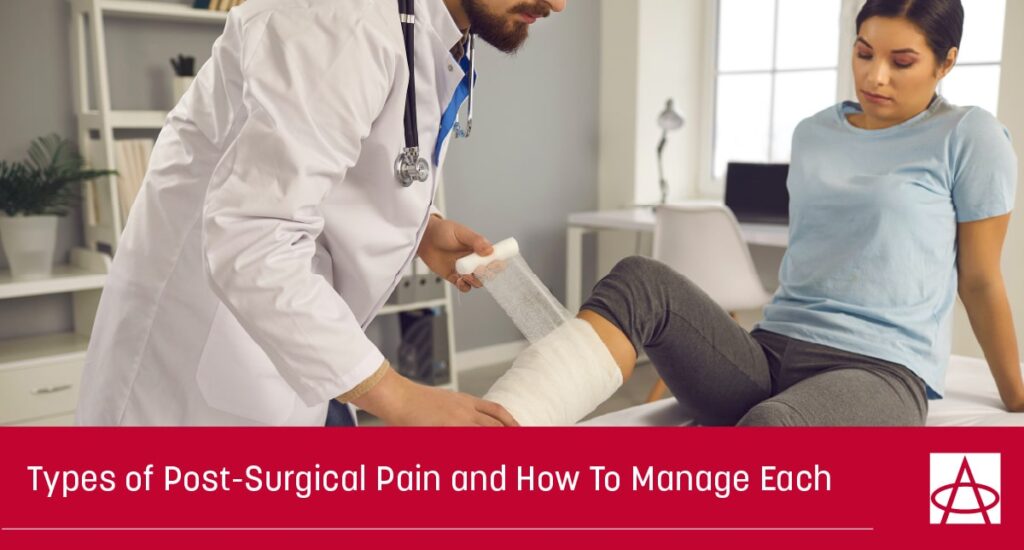Author: Matthew Hellman, MD
Postoperative pain is very common and has a variety of possible causes, including tissue damage. Tissue damage can occur at the incision, during surgery, or when the wound is closed.
You may also experience other forms of pain, such as muscle and joint pain in nearby limbs, caused by loss of mobility or overexertion due to surgery in the central area of the body that leaves you unable to move your other limbs or become more dependent on them. For example, if you had back surgery and are bedridden or use a walker or wheelchair, you may experience neck or leg pain because of changes in the mobility of your back.
The treatment options for each type of pain actually address the type of pain you are experiencing and the symptoms associated with it. If you are experiencing any type of pain that is prolonging, worsening, or becoming unbearable, it is crucial to contact your surgeon or pain doctor in hopes of getting it resolved as quickly as possible.
neuropathic pain
Post-operative pain caused by damage to nerve cells is called neuropathic pain. This pain occurs when damaged nerve fibers send incorrect signals to pain receptors.
You can experience neuropathic pain in two ways. You may feel a sudden sharp, stinging, electric shock, stinging, hot/cold, burning sensation in the area, or pain from contact irritation. Stimulation can be as simple as touching that part of the body to something harmless, such as brushing against a wall. You may also have trouble sleeping due to pain.
There are two types of neuropathic pain. Central neuropathic pain is caused by damage to the brain or spinal cord. This usually occurs during brain, head, or spinal surgery. Another type is peripheral neuropathic pain, which can occur in nerves that are not part of the brain or spinal cord. Typically, a person may experience this pain while undergoing joint replacement and repair.
The damage caused by neuropathic pain can be so severe that it may actually lead to more surgeries. For example: If you develop neuropathic pain in your arms and legs from surgery, you may need a second surgery to replace or repair the joints in that area to stop feeling pain.
Using nonsteroidal anti-inflammatory drugs (NSAIDs) such as ibuprofen may also relieve some symptoms. It may also be worthwhile to get regular massage and acupuncture to relieve pain. Your doctor may also prescribe gabapentin or Lyrica.
somatic pain
Somatic pain is pain that is concentrated in a specific area of the body. There are two types of physical pain: deep pain and superficial pain. Both depend entirely on how deep the wound or pain is to the outside of the body.
Superficial somatic pain may heal the fastest of the two. It can appear as cuts, bruises, burns, or skin wounds around the incision area. It tends to disappear after a period of healing. But if you want to support the healing process, there are over-the-counter non-steroidal anti-inflammatory medications, which can relieve pain and have anti-inflammatory properties respectively.
Deep body pain affects tendons, ligaments, joints, bones, and muscles. It can manifest as a dull or painful sensation in these areas and can spread to other parts of the body beyond the area of surgery. If your surgeon has to cut through muscles to reach certain areas of your body during surgery, you may experience deep body pain as a result.
Treatment for deep somatic pain is very similar to superficial somatic pain. However, your doctor may prescribe muscle relaxants and short-term opioids immediately after surgery to support your pain management. It is important to know how to take this medication because opioids are very addictive.
visceral pain
You may experience some pain in your major organs, causing vomiting, cramping, inflammation, overactive or underactive bowel and bladder function, or a rapid heartbeat. It can occur due to the physical and mental stress of surgery. This pain is difficult to pinpoint because it can occur outside of surgery as well. However, if you notice any changes in your body after surgery, it’s best to address these changes with your doctor.
You may be prescribed certain medications to relieve your symptoms, or you may always take over-the-counter medications that can treat certain symptoms. Depending on the type of pain, you may be able to relieve it through lifestyle changes, such as eating a nutritious diet and exercising regularly. Small changes can have a big impact on pain management after surgery.
It is normal for pain after surgery to persist beyond the time of surgery. However, if your pain persists and doesn’t get better, it may be time to see a pain doctor for support in your specific situation. Your doctor should be able to work with you so you can better understand your treatment options and develop a plan that works best for you.
Dr. Matthew Herman
Dr. Matthew Hellman is a dual board-certified, Harvard-trained interventional pain management physician and anesthesiologist. Born in northern Virginia, he attended Duke University, earning a bachelor’s degree in science and engineering while studying biomedical engineering. View profile


